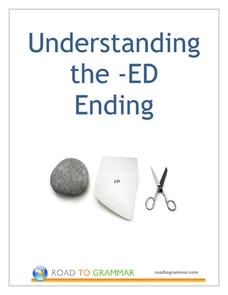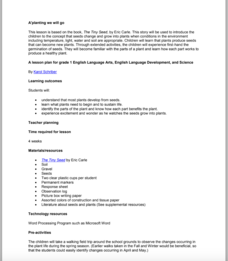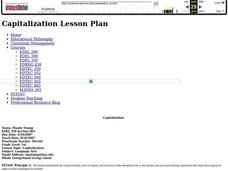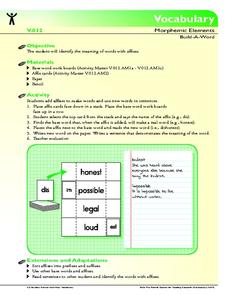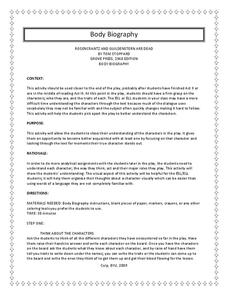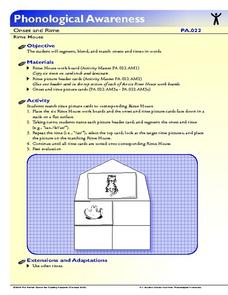Road to Grammar
Understanding the -ED Ending
English is a complex language, so take some time to clarify one aspect that is often confusing for English language learners: the -ed ending. This resource includes information about the different ways the -ed ending is used and provides...
Curated OER
A'planting We will Go
Germination is an amazing process that results in amazing things. The book The Tiny Seed is the inspiration for a set of activities that will help build early literacy, observation, language, and writing skills. The class observes how...
Florida Center for Reading Research
Comprehension: Monitoring for Understanding, Simple Summary
Can your class sum up a text in a few sentences? Help them build this skill by starting nice and slow. For this summarizing activity, the teacher marks the main ideas with sticky notes. Learners read and reread the text, pausing at the...
Curated OER
Capitalization
Teach your class the rules of capitalization with this fun, engaging lesson. Children participate in a learning activity, collaborate with peers, and practice their writing as they learn three specific rules: to always capitalize the...
School District of Palm Beach County
Framed Paragraphs characterization, problem and solution, symbolism, conflict
Support your learners as they work on writing paragraphs by providing graphic organizers, outlines, and frames. Sift through this packet to find the perfect organizers and templates to prepare pupils for writing. The resource...
Curated OER
Meet Your Neighbor: Action Verbs
Get your kids moving on the first day of school! This action verb activity doesn't have to be used as an ice breaker, but it sure will work as one. Simply place pairs of cards face-side down on the carpet, each with an action verb...
Curated OER
The Adventures of Tom Sawyer: Problematic Situation
Present your pupils with some moral dilemmas to examine. The scenarios, which learners rank by seriousness individually and then in groups, require learners to think about right and wrong.
Florida Center for Reading Research
Vocabulary: Morphemic Elements, Rooting for Meaning!
Scholars work with root and meaning cards to build vocabulary skills. Playing with a partner, learners read a root, locate its meaning, and cover it with a counter. The first player to cover their board wins.
Curated OER
Vocabulary Charts
Help your kids learn their vocabulary with a lesson plan and graphic organizer. After receiving a list of new vocabulary words, learners look up the definitions in dictionaries and fill in the worksheet. Additionally, they include a...
Curated OER
Poetic Elements Are Fun!
Engage your class in the elements of poetry with a series of lessons and activities. The plans cover simile, metaphor, personification, onomatopoeia, alliteration, and imagery. Learners come up their their own metaphors, identify poetic...
Sundance
Teaching Strategies: The Giver
Can utopia be achieved? Included here are three literature worksheets to pair with Lois Lowry's The Giver. Pupils work in groups to come up with solutions to society's issues, individuals back up a statement related to a topic in the...
Florida Center for Reading Research
Fluency: Letter Recognition, Speedy Alphabet Arc
On your mark, get set, match! Learners use a complete set of letters, matching each to its outlined letter on an arc. As they choose letters, they name them aloud. For added difficulty, another arc is missing most of its letters to...
Florida Center for Reading Research
Phonological Awareness: Rhyme, Rhyme Closed Sort
A rhyming activity challenges scholars to sort picture cards according to their rhyme. Four picture cards line up across the top of a pocket chart. Learners take turns choosing from a face-down stack of picture cards and sort them...
Florida Center for Reading Research
Rhyme Pie
Being able to recognize rhyming words is a step closer to understanding the phonemic blends that are necessary for building early reading skills. Little learners use the provided picture cards to make a rhyming pie. They glue rhyming...
Florida Center for Reading Research
Vocabulary: Morphemic Elements, Build-A-Word
An affix plus a base word equals what? A new word! Invite your class members to discover words using affixes and base words. Learners then write sentences using the real words that they put together.
Curated OER
Electronic Survey Activity
Fifth graders conduct a class survey and share the results with a class in another state via an electronic bulletin board. This technology-rich lesson is an ideal way to have learners practice communicating with others through the use of...
Curated OER
Vocabulary/Reading Lesson for Students with Severe Intellectual Disabilities
Here is a great little reading and vocabulary development lesson created just for learners with special needs. The lesson is constructed with both core content and necessary adaptations in mind. The group will use PECS, pointing/gesture,...
Brigham Young University
Rosencrantz and Guildenstern Are Dead: Body Biography
Pause in your reading of Rosencrantz and Guildenstern Are Dead to take an in-depth look at the characters. Learners examine a chosen character by drawing a body and assigning quotes and traits to specific areas of the body, thinking...
ESL Kid Stuff
Describing People (Adjectives)
As part of a series of lessons focusing on the parts of speech, language learners engage in games and exercises that encourage them to use adjectives to describe people.
1 plus 1 plus 1 equals 1
I Can Read! Sight Words Set #11
Work on the fundamentals with your little learners. A packet that focuses on four sight words (not, make, funny, and am) guides kids through reading activities such as matching, tracing, and word recognition.
Curated OER
Understanding Protagonists and Antagonists
How can you tell if a character is a villain? What about a hero? Work on literary analysis with an engaging language arts learning exercise. After completing an activity about the four types of conflict, learners fill out a character map...
Roald Dahl
Matilda - Throwing the Hammer
Full truth, or an exaggeration? How can you tell when a storyteller is exaggerating a story? Readers analyze a story told by Hortensia, and identify the exaggerative language she uses. Then, learners write their own narrative story using...
Orlando Shakes
Henry V: Study Guide
Shakespeare did more than write timeless literary works—he coined words such as moonbeam, fortune-teller, and even eyeball! A study guide for Henry V introduces key words the Bard first used with a fun vocabulary activity, part of a...
Florida Center for Reading Research
Phonological Awareness: Onset and Rime, Rime House
Are you covering onset and rime with budding readers? Here, learners examine six "rime house" work boards, each with an image at the top. Working with a partner, they segment each top image's onset and rime. Then, they pick cards and...
